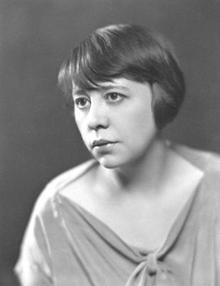Zoë Akins
| Zoë Akins | |
|---|---|
 |
|
| Born |
October 30, 1886 Humansville, Missouri, U.S. |
| Died | October 29, 1958 (aged 71) Los Angeles, California, U.S. |
| Occupation | Playwright, screenwriter, novelist, poet |
| Nationality | United States |
| Spouse | Hugo Rumbold (1932-?) |
| Information | |
| Magnum opus | The Old Maid |
| Awards | Pulitzer Prize for Drama (1935) |
Zoë Akins (October 30, 1886 – October 29, 1958) was a Pulitzer Prize-winning American playwright, poet, and author.
Zoë Byrd Akins was born in Humansville, Missouri, second of three children of Thomas Jasper and Sarah Elizabeth Green Akins. Her family was heavily involved with the Missouri Republican Party, and for several years her father served as the state party chairman. Through her mother Zoe Akins was related to prominent figures like George Washington and Duff Green. Her family moved to St. Louis, Missouri when Zoe was in her early teens. She was sent to Monticello Seminary in nearby Godfrey, Illinois for her education and later Hosmer Hall preparatory school in St. Louis. While at Hosmer Hall she was a classmate of poet Sara Teasdale, both graduating with the Class of 1903. It was at Monticello Seminary that Akins wrote her first play, a parody of a Greek tragedy. Following graduation Akins began writing a series of plays, poetry and criticism for various magazines and newspapers as well as occasional acting roles in St. Louis area theatre productions.
Her first major dramatic work was Papa, written in 1914. The comedy failed even though it greatly impressed both H.L. Mencken and George Jean Nathan, and she continued to write. She followed up with two other plays, The Magical City and Déclassée. The latter play, which starred Ethel Barrymore, was not only a great success but "something of a sensation, and her days of waiting were over." During this time several of her early plays were adapted for the screen. These adaptations were mostly failures, released as silent films in a time when the industry was transitioning to sound. While some "talkie" stars had notable roles in the films (Walter Pidgeon and a young Clark Gable), most of the films are now believed to be lost. In 1930, Akins had another great success with her play, The Greeks Had a Word For It, a comedy about three models in search of rich husbands
...
Wikipedia
